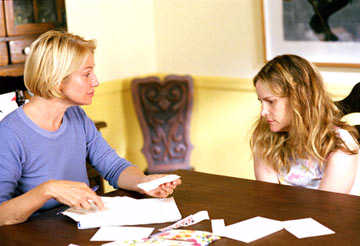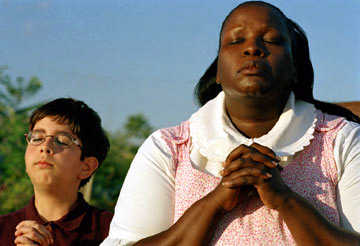

A palindrome is a word or phrase that is the same backwards and forwards. "Otto" is a palindromic name. One of the more famous phrases is "Able was I ere I saw Elba." Aviva, the name of the main character's name in Todd Solondz's new film Palindromes, is also one. Like the rest of Solondz's films (Welcome to the Dollhouse, Happiness, and Storytelling), it's hard to determine whether he wants to make his audience cringe or laugh. People want to laugh at some of the things on screen, but often they feel uncomfortable doing so. Here, Solondz is challenging people to look at people palindromically, or from both sides. To keep people off balance, he has seven actors play Aviva, a thirteen-year-old girl. They range in age from probably six or seven to forty, there are two black actors, one male actor, and one extremely obese actor.
Aviva is twelve, and all she wants to do is have a baby. To do this, she needs to get pregnant, and sets out to do so. Naturally, this horrifies her mother Joyce (Ellen Barkin, She Hate Me, Someone Like You), an otherwise liberal person. Aviva runs away, gets raped by a trucker (Stephen Adly-Guirgis, Jailbait, Meet Joe Black), and sets off on a bizarre journey, meeting a somewhat deranged Christian woman (Debra Monk, Center Stage, Bulworth), who adopts (more like collects) children with disabilities. Solondz frames each sequence with the name of a man, and switches Aviva actors every time a new sequence appears.
For the duration of the movie, Aviva wanders around, as if in some sort of daze. She doesn't see to grasp the rightness or wrongness of her actions. Jennifer Jason Leigh (The Jacket, The Machinist) and Sharon Wilkins (I, Robot, Bad Boys II) give the best performance, partially because they are nearly completely bereft of any emotion, and because each one seems so out of place as a young girl. Their dialogue drips listlessly out of the mouths, and their movements are slow and lifeless. Some of the actor transitions are pretty jarring, and at times feels more like a stunt than anything else.
Like Storytelling, Solondz's message is a bit muddled. He wants to show that Joyce and Mama Sunshine (Monk), while vastly different in terms of thought, are essentially the same person. Outside a happy veneer is a something darker, and less friendly. These women can be very friendly, yet are amoral when it suits them. It all goes back to the title. Aviva's journey away from home ends with her back at home. Smaller characters appear more than once, sometimes as different characters. And with everything that Aviva went through, is she really a different person? She may look, weigh, and sound different (due to the various actresses), but in the end, it's all the same. Yes, it can get pretty depressing, and yes, it is a bit pretentious.